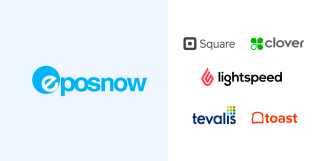Top 5 Square Alternatives & Competitors Review
Square provides point of sale systems for small to mid-sized restaurant and retail businesses. Their hardware and software are designed to help companies run more efficiently, with a focus on on-the-go payments via portable terminals.
Square is known for their barebones pricing plans, mobile transactions, and employee ease of use [1]. There are also some drawbacks to using Square, such as restricted choice of paid features.
We uncover the top 5 Square competitors to help you decide which point of sale (POS) system is best for your business.
Note: All product features, pricing, and other details are accurate as of February 2022.
#1: Epos Now
Summary: Epos Now is a great alternative to Square because they offer better pricing and integration versatility.
Functionality
Epos Now are market leaders in POS software and hardware. Like Square, Epos Now split their software into two main categories. Square caters their POS software to the retail and restaurant industries, while Epos Now caters to retail and the wider hospitality sector.
Epos Now is one of the more popular alternatives to Square because of the sector-specific offerings. Epos Now have dedicated software modules for restaurants, pubs and bars, takeaways, and hotels. The same goes for retail, with separate technology available for clothing shops, electronics stores, convenience stores, and more.
Square and Epos Now are both hailed for their simple payment processing fees and versatility in accepting a range of payment types. Both brands accept chip-and-pin and contactless mobile payments, remote transactions, and online payments.
One great feature that both platforms offer is fixed rates on credit and debit card payments.** Epos Now allow third-party processing alongside their own merchant services, (Epos Now Payments), whereas Square only allows their own payment processor (Square Payments).
Hardware
Hardware-wise, Square POS software is available on Square devices, Android and Apple. Epos Now software is available on Epos Now devices, Apple, Android, Windows, and PC.
A clear advantage of Epos Now is that their hardware isn’t locked to their software, meaning if you wanted to take your Epos Now terminal or Pro+ and switch to a different POS provider, you can.
Both Epos Now and Square offer bundles on their hardware and software, with Square including some POS features for free on hardware-only purchases. However, since Square hardware is only compatible with Square software, purchasing their software is a prerequisite.
Software
Square’s free software is limited. Most merchants who run a busy or growing business are required to upgrade to a larger, paid software bundle if they want to access more features.
Inventory management features such as bulk intake, inventory history and counting are missing from Square’s free software package, and only available with Square Retail Plus, which starts at £49/month. These features are available from £25 per month at Epos Now.
A key element in any point of sale system is the reporting feature. A good range of reports are available with Square Retail Plus software including sales reports, profit margin reports, COGS, and vendor sales.
Epos Now offers the same reports, along with employee sales and entry reports, time-comparison reports, and item-specific performance reports. These are incredibly useful for spotting sales trends and identifying drains in your resources.
The integrations available at Epos Now are what truly sets them apart from Square. There are 100s of third-party integrations available for the purpose of giving merchants ultimate control over their POS experience. Epos Now believes that if a business works well with particular software, then the POS should be able to support it, allowing merchants to sync their data and access everything they need in one place.
Epos Now’s flexibility allows merchants to only pay for the services and integrations that they want and need. While it’s true that Square’s tiered payment plans provide access to a solid variety of services, they are pre-selected, meaning you might be paying for something that you didn’t pick and don’t need.
Check out a full breakdown of the differences in our blog, Epos Now vs Square.
#2: Toast
Summary: Toast is a good Squareup alternative if you own a restaurant, as they specialise in the hospitality industry. Square takes the upper hand for retailers.
Some features Toast has ahead of Square include food delivery management, and a dedicated takeout and delivery app [2]. These are optional add-ons that are part of Toast’s Essentials package, which starts at a punchy monthly fee of $165 USD.
Since Square offers POS systems for a variety of businesses, including retail businesses, some of their features are more versatile. For example, Square can process refunds by the item, refunds by specific amounts, and send digital/email receipts, which Toast does not currently offer.
Connectivity-wise, Toast and Square are neck and neck. Like Epos Now, both systems offer offline mode, which lets merchants accept payments without internet connection. They are both cloud based POS systems, meaning data is securely saved online, and business owners can check in on their business remotely.
#3: Tevalis
Summary: Tevalis targets businesses that are focused on expanding and generating large profits, and Square is more suitable for small and mid-sized businesses.
Tevalis are market leaders within enterprise and large-scale business POS technology for hospitality. For the sake of fair comparison, we’ll compare Tevalis’ Restaurant POS to Square’s Restaurant POS.
Tevalis’ features are firmly focused on growth. Their reporting is synced with their business suite add-on for an additional price. Here, managers can read reports on daily profit vs revenue, revenue vs visits, best sellers by quantity, and even top sites by revenue since there is a focus on omnichannel selling.
Square software is customer-centric, which many businesses will prefer. Tevalis offers incredibly advanced services that are useful for businesses aiming for large-scale growth.
#4: Clover
Summary: Clover are a good choice if your business needs affordable hardware. However, Square take the lead for better device flexibility.
People often look to Clover for a cheaper Square register alternative. They both offer terminals with a main touchscreen and a user-facing screen. They have similar designs and have unique features for optimal user experience. Square also offer a Square reader, stand, terminal, and register.
Clover and Square both provide their own payment terminals for credit card processing, Apple Pay and Google Pay. Square also supports Samsung Pay, which Clover does not.
Square also sell magstripe readers that connect to Apple devices and Square terminals, which is different from all others on the market.
Since Clover software is only compatible with Clover devices, the pricing plan is relevant to the hardware you select. There’s the Register Lite and Register Plans, which respectively cost UDS $9.95/month and USD $39.95/month. Alternatively, for restaurants, there’s the Table Service Restaurant for USD $69.95/month. So, pricing is similar to Square, and you have the same option of choosing between retail or restaurant-specific software.
A great advantage of Clover is that they offer employee-focused features, such as customisable tip screens and performance measuring tools. Clover also allows managers to set varying levels of permissions and access for different employees, which is extremely useful for a small business or a business with high employee turnover.
#5: Lightspeed
Lightspeed are favourable due to their advanced CRM features. However, Square offer a much better hardware line.
Interestingly, and to Square’s advantage, Lightspeed doesn’t offer their own till. Instead, they offer integration with Apple products, the Apple Mac PC or iPad. They do note on their website that you can mix and match different hardware brands if they are compatible with their EPOS software [3], so it’s possible to use your existing devices instead of paying for nominated hardware.
A nice feature that Lightspeed offers is the ability to customise the colour palette of your POS to show off your business’ branding.
Lightspeed’s customer relationship management (CRM) services are very impressive. With Lightspeed POS, you can receive an estimate of a customer’s lifetime value based on purchase history, and make relevant purchasing recommendations based on customer shopping behaviour.
Read Epos Now vs Lightspeed for more information next.
Frequently asked questions
- Who is Square’s main competitor?
-
If Square has one main competitor it's Epos Now, particularly for retail and hospitality businesses. Both offer all-in-one POS software, payment processing, and hardware, but Epos Now stands out for its flexible technology and bundle packages to suit a wide range of businesses. Epos Now offer broader integrations and industry-specific solutions. It also supports third-party payment processors and multi-location setups, making it a strong choice for growing businesses that need more customisation than Square provides.
- What can I use instead of Square?
-
If you’re looking for an alternative to Square, Epos Now is a popular replacement thanks to its scalable software, wider hardware compatibility, and stronger inventory and reporting tools. Other options include Toast for restaurants, Lightspeed for inventory-heavy retail, Clover for simple hardware bundles, and Tevalis for enterprise hospitality. The right choice depends on your industry, budget, and growth plans.
- Is Square the cheapest option?
-
Not necessarily.
Square’s flat monthly pricing and simple transaction fees make it affordable for smaller businesses, but costs can rise rapidly as you process more payments or add premium features. Providers that offer custom or interchange-plus processing rates may work out cheaper for high-volume merchants. It’s important to compare the total cost of ownership, including hardware, add-ons, and fees, not just the base subscription. - Square vs Epos Now: Which is better?
-
Square is popular with startups and smaller operations that want a simple, plug-and-play system. However, Epos Now generally offers more flexibility, deeper inventory management, broader integrations, and the option to use third-party payment processors. For businesses planning to scale or needing industry-specific tools, Epos Now often provides better long-term value and functionality.
- What are the best Square alternatives for restaurants?
-
For restaurants, Epos Now is a strong alternative thanks to its hospitality-focused features, including table management, stock tracking, reporting, and flexible hardware options. Toast is another popular choice for kitchens needing advanced tools like kitchen display systems and delivery integrations (though Epos Now has those two, making both strong options). Businesses that need deeper restaurant workflows or multi-site control may benefit from these specialised systems over Square’s more general setup.
- What are the best Square alternatives for retail?
-
Epos Now is one of the best Square alternatives. It offers advanced inventory controls, supplier management, barcode scanning, and detailed reporting as standard, which are essential for larger catalogues or multiple stores. Epos Now also has excellent ecommerce integrations to ensure any business that uses it can compete in every arena. Lightspeed is another strong option for inventory-heavy operations.
- Do Square alternatives have better customer support?
-
Support quality varies by provider, but Epos Now offers a more hands-on onboarding, dedicated account management, and a wider variety of support options to suit the needs of each moment and the businesses relying on them. These include over-the-phone support, Livechat, video guides, instruction guides, and dedicated onboarding agents for when you're getting started.
For restaurants or multi-site retailers that rely heavily on off-peak support, having accessible, responsive support outside of traditional business hours can be just as important as features or pricing, and Epos Now offers that support.
- Can I use my existing hardware with Square alternatives?
-
Often, yes. Unlike Square, which mainly works with its own hardware, many alternatives allow you to use third-party or existing devices such as iPads, Android tablets, PCs, and compatible terminals through a downloadable POS app. Epos Now supports flexible hardware setups, which can significantly reduce switching costs and make upgrades easier as your business grows.
Get started with a multi-award-winning POS solution
Epos Now offers state-of-the-art POS systems for businesses in various industries. We let you choose the tools and insights to help make your business achieve its goals. Designed to work as a complete business management system, you can control all vital aspects of your company from one cloud-based system.



